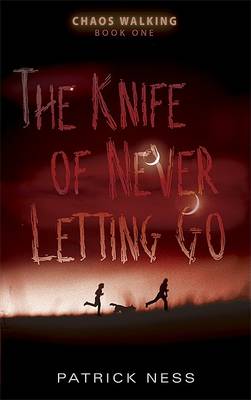Reviewed by nannah on
Content warnings:
Animal death: the dog dies …
Gorey imagery
Settlers left the Old World for a simpler, better, and more peaceful life guided by God. Unfortunately, the hardships of New World didn’t allow that to happen: infertile soil, foreign diseases … and the Spackle, an alien race the initial scouts failed to discover. Todd Hewitt, the last boy in his town (who will become a man in thirty days) has grown up on this strange New World, where all men can hear each other’s thoughts in Noise, a jumble of words, thoughts, feelings, and pictures. Women never had Noise, but then, they were all killed off by the Spackle disease in the war before Todd was born.
Todd doesn’t know what will happen when he becomes a man, but he knows it’s important, because all of the friends he had don’t talk to him any more, not since they became men themselves. But when he discovers a pocket of silence -- an impossible area of no Noise at all, an actual, living girl -- the town’s secrets (and the entire New World’s) start to spill over.
The concept of this is so original and kept my attention to the very end (which is a cliffhanger … beware). The main two characters are very well described and realized, with, let’s be honest, major flaws. But that’s what I love about them. Even when I’m so almost unbearably angry at them, it’s wonderful because I’m angry at them for being so well-realized, not for being stupid for the plot’s sake or awfully written.
The writing is kind of a mixed bag. On one hand, it makes the action and emotion very immediate. It’s written in a dialogue style, using misspelled words and incorrect grammar -- mostly because our protagonist can’t read and has a southern-style accent (ish). While this can be super, incredibly annoying, this is probably the only book where it works more than it doesn’t. I think because even without the use of the dialogue, the writing is still very strong (as compared to, and I’m sorry, but Blood Red Road by Moira Young, where her style was a crutch rather than something to add to her world and story). However, reading The Knife of Never Letting Go this time around, there were things from the style that bugged me, like the use of “effing” -- where once or twice it would be okay, but several times it became way … way too much (“and I didn’t say ‘effing’ either”; “and do you think I said ‘effing’”?, etc.). The misspelled words didn’t bother me as much as I thought they would, but eff, those effing words just took me right out of the story.
Lastly, I just want to touch on the gender thing the book has going on. I was hoping upon reread there would be hints of something in regard to other genders, but -- at least in the first book here -- there was nothing. I know Patrick Ness supports trans people and he talks about them often in interviews about how he’s very excited to read and support books by trans authors, so he’s (probably) not transphobic, which is great. So maybe this was just something he … overlooked about 10+ years ago, or became aware of later. But in any case, the whole “women have no noise, men have noise, and that’s IT” is a little uncomfortable to read as someone who’s non binary. Where would people like me fit in?
Anyway, I’m unbelievably happy to find out that this book is still one of my favorites.
Reading updates
- Started reading
- 13 April, 2012: Finished reading
- 3 January, 2020: Reviewed
- Started reading
- 3 January, 2020: Finished reading
- 3 January, 2020: Reviewed
